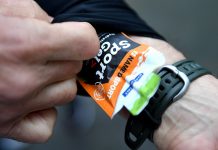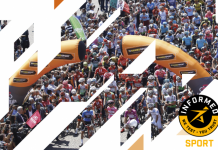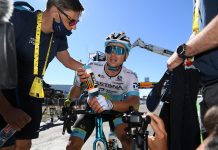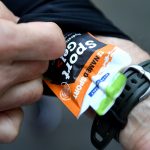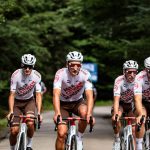We had the pleasure of hosting Lisa Migliorini, better known on socials as The Fashion Jogger, for a training session on the topic of integration for runners.
For the 20th Milan Marathon, we asked her to give some advice to marathon runners who will be able to find our products at the rest points along the route. Lisa is not just a young and talented athlete, but she is also a physiotherapist and an osteopath. She follows professionals and beginners who go see her to obtain the best psychophysical balance, also on delicate topics like nutrition integration, and the right workouts to sustain their running performance.
We know that you won’t be able to run the marathon because of a minor injury.
The marathon has always had a special charm for me, but after a small surgery I can only o get back in the game on the 10Km, the relay. However, I really want to give marathon runners some advice to get ready for this day.
Let’s start from the beginning: how should breakfast be?
First of all, try to get up early, so that you can have breakfast at least 3 hours before the start of the marathon. Have a balanced breakfast, with a good amount of carbohydrates, fat, and proteins, that will be useful for the race. In the 2 hours before the race, sip some water to avoid performance’s drops due to poor hydration.
How to warm up and prepare the body for this effort?
Once you get on the race’s site, a little before starting, begin with a dynamic warm up, you can jog for 10 minutes in order to gradually increase your heart rate and oxygenate the muscles, then you can focus on forward, and side lunges. Then, you can bend forward touching your feet, alternating arms.
The warm up continues with a light run in place first kicking behind, and then with your knees high up, ending with some breathing exercises to maximize lung capacity.
In order to prepare your body, besides the warm up we also always suggest to eat a “waiting ration”. Do you do that, too?
It’s fundamental to keep hydrated and perhaps to eat a small meal 60 minutes before the start, with energy bars or gels , like Total Energy Fruit Jelly>.
These are particularly suitable for endurance sports as they are rich in minerals, and carbohydrates with different speeds of assimilation. Also, their particular consistency allows us to store energy that we will then gradually but steadily use during the race.
How can we increase endurance and energy during the race?
If your activity exceeds 2 hours, it’s best to alternate gels and bars about every 45 minutes, without waiting to feel thirsty or hungry, since it would be too late by then.
Study the rest points where you can refuel, and test beforehand the supplements that you’ll find on the route, so that you can make sure of your body’s possible reactions.
What do you choose in this case?
The isotonic gel is ideal because it is easy to take with you and it does’t require water. Isotonic Power Gel> prevents muscle glycogen deposits from falling below the performance threshold. You will notice the effects of the energy release after about ten minutes, and the remaining carbohydrates will be released progressively.
What if we prefer to eat something?
After about 45 minutes, you will need something to eat: we are talking about the Total Energy Fruit Bar>. A tasty energy bar with puffed rice, and fruit, enriched with vitamins and designed for endurance sports, it promotes a rapid energy replenishment during sports activities.
The last few kilometers are the toughest, our body and our mind start to get tired. What can we do?
When you reach the 30km mark, when the race gets more intense and energy starts to fade, you will need a boost of vitamins, which will help you finish the marathon at your best. Within the last hour, you can take a vial of Guaranà Super Strong Liquid,a small toning shot with antioxidants, stimulants, and a high amount of caffeine. It’s ideal to recharge you before the final sprint.
We know that the marathon doesn’t end on the arrival line, once you pass the finish line it is important to take care of recovery in order to recuperate fast.
For sure the satisfaction of being able to cross the arch can greatly repay you of the fatigue. However, you must continue to take care of you body in order to recuperate faster.
During a long race like a marathon, your body not only will lose liquids, but also a lot of minerals, proteins, carbohydrates, and fat. Since this is an out of the ordinary effort, your body will not be able to immediately replenish all the reserves, that’s why you need to try to get all the values to the right levels.
Total Energy Recovery> is perfect for this phase: its formulation, and the practical single-use packaging, are ideal to support muscular recovery after an intense training, all the necessary ingredients for you post race are included in one solution to dissolve in about half a liter of water. The energy release is gradual and prolonged overtime, to avoid glycemic spikes, but still given the body quickly available carbohydrates.
In order to maximize the effects, I suggest to take it within half an hour from the end of the marathon.
Photo credits: @LaPresse







